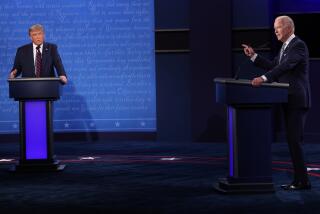STARTING WITH THE PEOPLE<i> by Daniel Yankelovich and Sidney Harman (Houghton Mifflin: $18.95) </i>
- Share via
Democracy might mean “government by the people,” but the American people have never had a direct say in their government’s policies. We elect representatives to make political decisions for us because polling millions of citizens honestly and swiftly about major issues of the day traditionally has been far from practical. Now that advances in computers and telecommunications have made direct representation possible, however, a new objection has been raised: Important policies in modern America, it is said, are too complicated to be decided by ordinary Americans. In “Starting With the People,” Daniel Yankelovich, a social scientist and pollster, and Sidney Harman, President Carter’s Undersecretary of Commerce, effectively undermine this argument. “A wonderful education in computers and math models does not give a person wisdom, judgment, and sound values,” they write. And yet values, not an objective analysis of data, are the basis of decisions on important issues, such as the nuclear arms race, the trade deficit and military intervention abroad.
Rather than letting the experts tread on the political domain of voters under the guise of offering advice on technical questions, the authors propose, government policies should be devised from hard data about public values. A laudable idea, of course, but easier said than done, as this book unintentionally reveals. The authors, for instance, report that in 1955, only only 1 out of 4 Americans felt “all humankind would be destroyed in a nuclear war,” while in 1987, 9 out of 10 felt that way. In fact, the question asked in 1955 was: “Do you think all mankind would be destroyed?” while the 1987 query--”Do you think both the U.S. and the Soviet Union would be completely destroyed?”--was not analogous, leaving open the possibility that some pockets of people would survive. This is a bold, provocative work in spirit, though, showing how far we have strayed from democracy in practice, if not in principle.
More to Read
Sign up for our Book Club newsletter
Get the latest news, events and more from the Los Angeles Times Book Club, and help us get L.A. reading and talking.
You may occasionally receive promotional content from the Los Angeles Times.







